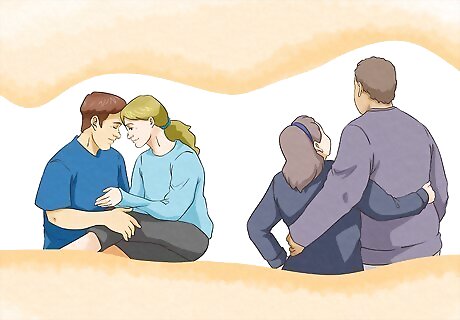
views
- INTJs are externally-focused, which means they're more organized and goal-oriented, while INTPs concentrate on learning and making new mental connections.
- INTPs are quiet, withdrawn, and conflict-avoidant, while INTJs tend to speak their minds and engage wholeheartedly in debates.
- INTPs want relationships built on understanding, while INTJs crave stability and intellectual stimulation.
How They Approach Work

INTPs enjoy analyzing and research, while INTJs focus on the end goal. One of the biggest differences between INTJs and INTPs is the way they develop themselves and their career. INTJs are ruled by Introverted Intuition (Ni), which means they often have a clear vision of what they want to accomplish, they’re hardworking and methodical, and they’re willing to go the extra mile to achieve their goals. INTPs are ruled by Introverted Thinking (Ti), which means they tend to enjoy and focus more on solving puzzles and analyzing, comparing each new idea to what they’ve already learned through life. When presenting arguments, INTPs love to talk about their ideas, but take time to outline each idea and see the full picture rather than rush to the conclusion. INTJs tend to vocalize their thoughts more, focus on the most relevant information, and come to a firm decision.
How They Approach Leadership

Both types tend to avoid leadership roles, but INTJs are more likely to step up. As independent thinkers, INTJs and INTPs prefer to work behind the scenes. However, INTJs might accept leadership roles more than INTPs because they’re more likely to present themselves as reliable, effective, and better at making decisions in a timely manner and sticking to them. This doesn’t mean that INTPs aren’t good leaders too! They just tend to be more focused on developing people and are satisfied with the success of others. They tend to stay open to the possibility that there’s always a better way to do things or that they missed something.
How They’re Viewed by Others

INTPs are withdrawn, while INTJs are more likely to speak their minds. Both INTPs and INTJs are led by the Introvert (I) function, however, INTJ’s dominant function is judging (J), while INTP’s is perceiving (P). Because they make judgments easily, INTJs can come off as judgemental and opinionated and are more likely to engage wholeheartedly in intellectual arguments. Meanwhile, because INTPs tend to analyze more, they can come off as lost in their own heads and more focused on their inner selves. Many people think that INTJs can be uncaring or cold. However, that isn’t always true. It can take some time for them to warm up to you, but once you gain their trust, INTJs can be extremely caring toward their friends and the people they love. INTPs are less focused on their external surroundings, which means that they tend to be less worried about what other people think about them. They’re selective about who they share their emotions with but are prone to party when conditions are right.
What Stresses Them Out And How They React

INTJs overact under pressure, while INTPs can lose their way. INTJs often have a hard time relaxing in general, can be impatient with themselves and others, and might use external outlets like partying or food to deal with stress. INTPs, on the other hand, try to keep their emotions on the down low. They’re generally more patient and relaxed but can get stressed out when they doubt themselves, have too much going on, or are having difficulty identifying or communicating what they’re feeling. Under extreme stress, INTJs are more likely to engage in dangerous or reckless activities. However, by seeking out ways to live in the moment and make the most out of the time they have, they may discover what their life goal or mission is.
What They Look For In Relationships

INTPs want a relationship built on mutual understanding, while INTJs crave stability. INTPs appreciate a partner that understands and accepts them completely. They love honesty and clear communication and thrive in a relationship full of openness. Their creative, vivid imaginations make them surprisingly enthusiastic and passionate partners. INTJs want physical security and intellectual stimulation above all else. They’re best matched with someone who can match their mental energy and allow them to feel relaxed enough to share their entire self. Romantic relationships can encourage INTPs to stop and smell the roses. The right partner can help them break out of their own mind and allow them to experience joy and pleasure in the present. Love can be a challenge for INTJs, who tend to apply a relentlessly critical eye to the world. They aren’t known for conventional expressions of romance, like cards or flowers, and when it’s time to share their emotions, they might feel exposed or uncomfortable. However, the right partner can teach them to remain in the present, connect with their emotions, and be open to things they’re not used to.
How They Handle or Express Their Emotions

INTJs are more sensitive, while INTPs are less aware of their emotions. INTJs have an introverted feeling process (Fi) which means that they tend to be more sensitive and less vulnerable with others. They feel exposed without their emotional walls, which can make it difficult to get to know them. Meanwhile, the extroverted feeling (Fe) of the INTP means that they have a much greater capacity for tuning out their emotions and remaining logical—until their feelings get too much or something sets them off. Then, they can be anything but quiet about their emotions. INTPs are considered to be less sensitive than INTJs and tend to be less aware of their emotions or might overly control them. As a result, they can become complacent with unpleasant situations or come off as insensitive or unkind to others, when their intentions are generally good. INTJs are more rational and aware of their emotions — they view their feelings as something that is their responsibility to deal with.
How They Make Decisions

INTJs dive headfirst into complex problems, while INTPs have to analyze more. INTJs focus on one goal, deal with conflict resolution more effectively, and refuse to rest until they achieve their own definition of success. They can sometimes come off as combative, but that’s only because they love making decisions and seeing them through to the end. INTPs, however, tend to brainstorm the problems presented and create possible solutions. INTPs seek the truth, but tend to overthink and overanalyze—they want to get things done, but their perfectionism can easily get in the way if gone unchecked. For INTPs, new ideas come from their endless stores of learned information, while for INTJs, inspiration seems to strike out of nowhere, and they’re more likely to act on their ideas than explore them from all angles.
How Flexible or Organized They Are

INTPs are more flexible, while INTJs are more strict and organized. INTPs are less concerned about tuning in with the outer world and are less particular about organizing their surroundings. Instead, they are more interested in connecting information and spend the most time inside their own heads, creating new networks to explore. INTJs are more organized and minimize distractions like cluttered or disorderly environments so it doesn’t interrupt their thought process. Although INTJs can be extremely organized, which can help them stay on track, they can also be more impatient and rigid. INTPs, on the other hand, might more patient and flexible—however, they can also be less neat or tidy about their workspace or personal hygiene.



















Comments
0 comment